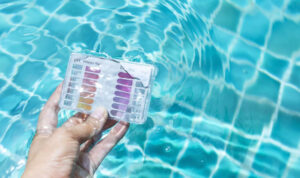Regular pH tests are a way of life for many swimming pool owners, but why? In this article, we explore some of the most common questions around pH and the use of chlorine, as well as a superior option for safe and clear swimming water.
First up, what is pH?
Measuring pool water pH means you’re measuring the water’s acidity, on a scale from 0 to 14 with 7 being neutral. Anything below 7.0 is acidic, while anything above 7.0 is alkaline.
Why does pH matter so much in swimming pool water?
pH matters a great deal because pool water chemistry needs to be balanced for safe and hygienic swimming. Too low a pH can cause skin and eye irritation and weaken concrete structures. Meanwhile, a too high a pH may cause calcium deposits around the pool or in the chlorinator, and also inactivate chlorine, which can lead to higher pool operation costs.
What is the ideal swimming pool pH?
With conventional (chlorine) chemistry, the pH needs to be around 7.2 to 7.6. However, most pools tend to drift towards their natural pH of around 8 to 8.5, so they require regular addition of acid to reactivate the chlorine. These strong acids are dangerous and corrosive material that should be handled with great care.
Is chlorine the best pool sanitizer?
Chlorine is used in the vast majority pools because it’s relatively affordable, but this doesn’t mean it’s an ideal choice. Pool chlorine is a poor disinfectant in water that has a pH over 7.6, and a chlorine pool can therefore demand constant monitoring and adjusting. Anyone who’s spent weekends lugging chemicals from the pool shop will be all too aware of this! Chlorine can also cause irritation to eyes, hair, lungs and skin, as it creates chloramines in the presence of organic matter such as natural oils, sunscreen, sweat and debris in the pool water. So as you can see, far from ideal!
Is there a better alternative to chlorine?
We strongly believe so, and it’s called Advanced Water Chemistry. This system uses bromine, which is commonly used in hot tubs, to maintain pool water that’s gentler on the skin, hair and eyes. Pools using Advanced Water Chemistry can operate at a higher pH, closer to the pool’s natural pH level. This means that far less acid, buffer and stabiliser is required – if any – and a more pleasant swimming experience can be expected.
You won’t even need typical water test kits when using Advanced Water Chemistry and the Pooled automated system. Your app simply notifies you if salt is needed. The other chemicals are delivered as required, usually twice a year in a small package.
Advanced Water Chemistry takes the worry, wasted time and weekend trips out of pool maintenance, and delivers sparkling clear water for you and your family. It’s suitable for any pool that already uses chlorine.



